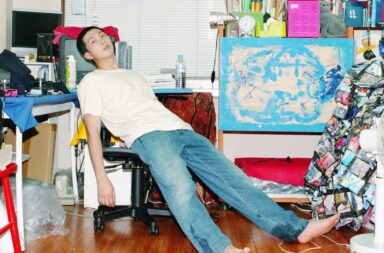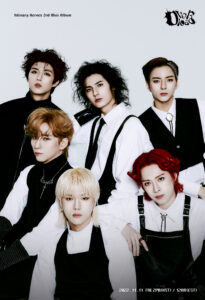
Only four months after the release of their first mini-album, Hello, World!, Xdinary Heroes are back, and this time, with a vengeance. Shedding their bubblegum hair and bright, rambunctious energy from their previous releases, the six-piece rock band is now at war with an ominous enemy—themselves. Overload marks the second chapter of the band’s growth, this time coming face to face with their internal struggles.
Conflict is apparent in every track: from fighting against sleep and nightmares to the voices in their heads. The lyrics display the members’ ingenuity and honesty, but the lack of melody and memorability, unfortunately, makes Xdinary Heroes’ sophomore mini-album a musical dissonance.

To understand Overload, it is essential to establish that the album is a continuation of their evolving narrative. After becoming victors in the virtual platform called ♭form, the members are now coming to terms with their newfound fame. We see this in their third installment of The Origin of Heroes as things are headed for a sinister turn for the questionable heroes. Questionable is the keyword here as we are also confronted to ask about their identity, as hinted at the end of the “Test Me” music video: Are they heroes or villains?
The answer isn’t superficial; this is where the battle begins for Xdinary Heroes. The album begins with the psychedelic “Sleep Talking,” wherein the band includes a short spoken intro and a nonsensical refrain from leader and drummer Gun-il:
Did Jooyeon leave?
Hey, listen first
I’ll try first
Bananas are long, long, long
A wild goose, even if you flip it’s still a wild goose
Bananas are long, long, long
A wild goose, even if you flip it’s still a wild goose
Similar to when we hear someone sleep talking, we don’t know if they’re awake or asleep. The refrain sounds ridiculous as we listen to it repeatedly throughout the song, but it later makes sense as the members express their confusion about whether they are in a dream or reality. Following the band’s narrative, the blur pertains to their online (extraordinary) and offline (ordinary) versions of themselves. Eventually, they give in to their sleep and the extraordinary versions of themselves because they believe it is “more correct” or “better than the world I’ve known.”
The menacing laughter at the end of “Sleep Talking” segues to “Hair Cut,” the album’s promotional track. Negative thoughts that cause doubt and anxiety are likened to hair in which the members encourage to “cut it out,” “slice them all,” “throw it out,” “let it go,” and “let it blow.” It is a rather amusing metaphor, as having a haircut could signify a new beginning or a refreshed identity.
However, it isn’t that easy. Middle tracks “Lunatic,” “Crack in the Mirror,” and “Ghost” revolve around the theme of persona and identity. During the comeback showcase, rhythm guitarist and vocalist Gaon admitted that he was inspired by Joaquin Phoenix’s portrayal of the Joker while writing “Lunatic.” Like Arthur Fleck spirals into lunacy because of society’s broken system, the members descend and enjoy their craziness to change the world. After all, they’re “not superman but lunatic.”
“Crack in the Mirror” falls under the same vein as “Hair Cut” in the use of imagery in the lyrics. Looking at a mirror is a way for us to see ourselves. When a mirror cracks, it reflects a disjointed picture of ourselves. Usually, one crack leads to another, eventually breaking the mirror into pieces, and we cannot recognize ourselves in the reflection. The members use this analogy as doubts and worries break their seemingly perfect image.
I guess I’ve lost myself (I guess I’ve lost myself)
Even if I cover the gap with both hands (even if I cover the gap with both hands)
It goes bad
A gradual sign of collapse
Just tryin’ to go back to what I was though
The more you look at me
Face up
The crack is getting wider
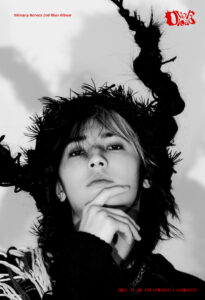
Despite being the shortest track in the album, “Ghost” contains the most impactful lyrics in the entire album. Contrary to their bold confidence in their previous songs, the fear of their purpose haunts them as heroes.
One day
Someone came to see me
What we playin’
They say it’s just a noise that hurts the ears
In my ear
The full noises
Bitterness mixed with resentment
With both ears covered
I feel like I’m in a broken dream
The band is not referring to objective criticism but derisive attacks that affect them personally. From an idol perspective, “Ghost” can refer to people who leave nasty comments anonymously. Brushing them aside sounds easier said than done, as it causes them to doubt themselves.
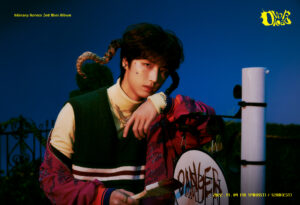
The album closes with “X-mas,” which is probably the most bizarre and seemingly misplaced track lyrically. The song is not about Christmas but seems to infer from Tim Burton’s “Nightmare Before Christmas.” As much as the movie is Halloween, as it is Christmas with an unlikely hero in the form of a skeleton, the members seem to have embraced their inner monster. It’s a chilling ending but leaves room for a highly likely succeeding album on what happens next to our heroes.
Ah-ooh, don’t look back
On a night full of goosebumps
I’m confused
The stranger in the mirror, is it me? Yeah
Hiding it to make sure you can’t find it
You might see my black hair
Strange and chilling today
Watch out for the flickering lights
Continuing their play on programming language, Overload borrows from the general definition of the word, which means “exceeding its recommended limits.” Overloading in computer programming can produce various outcomes with the same name but different parameters. Sadly, “Sleep Talking” and the titular “Hair Cut” fall victim to being overloaded by trying to sound too gimmicky. “Hair Cut” seems explicitly to gear toward experimental rock.
Still, too many elements—auto-tuned vocals, space tech sounds, a swoosh of a blade, and a boomerang swing— distract from the vocals and the instruments. Not to mention, both songs share this stop-and-go energy that makes them unenjoyable. It is disappointing for a band to follow the fractured and disjointed musical bandwagon set by many fourth-generation boy groups. (Well, we shouldn’t look any further as this also seems to be a trend among current JYP Entertainment artists like Stray Kids, Itzy, and Nmixx.)
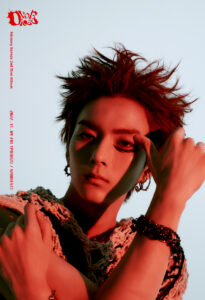
Thankfully, the rest of the tracks do not follow suit. While Xdinary Heroes have been carving themselves into punk rock, they seem to be treading along other rock genres. “Crack in the Mirror” particularly stands out with Gaon’s and lead guitarist Jun Han’s respective riffs. The song somewhat leans towards power metal, which would have been exciting to explore if the song would go over three minutes. “X-Mas” mixes industrial rock elements and varying vocal tones, including spooky whispers from Gaon and O.de.
Despite their powerful message, Overload focuses more on the concept and is a step back from their musical cohesiveness and stickiness from Hello, World! Their non-conformist ways and gutsy attitude are admirable, but there has to be a balance between experimentation and likeability to attract new listeners. Hopefully, in their next album, we will see how Xdinary Heroes transition from overload to overcome, not just conceptually but more so musically.
(YouTube [1][2]. Computer Hope. Lyrics by Genius Korea. Images by JYP Entertainment.)
